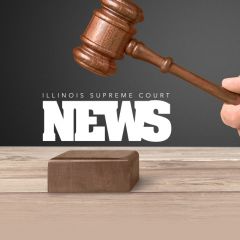The Illinois Supreme Court announced the filing of lawyer disciplinary orders on May 18, 2020. Sanctions were imposed because the lawyers engaged in professional misconduct by violating state ethics law.
Practice News
-
May 18, 2020 | Practice News

-
May 18, 2020 | Practice News

The Illinois Code of Civil Procedure allows a party to submit one or more special interrogatories to the jury. A special interrogatory is a question submitted to the jury by a party seeking a determination of a specific issue or question of fact and is submitted along with the general verdict forms. The purpose of a special interrogatory is to test the general verdict by ensuring the jury understood its instructions and each element of the cause of action necessary to enter the judgment indicated. In her May Illinois Bar Journal article, “What’s So Special About Special Interrogatories,” Amy Frantz discusses the use of special interrogatories in general, provides practical tips for attorneys on their use, and highlights recent extensive changes to the special interrogatory statute.
-
May 14, 2020 |
Practice News
The U.S. Attorney's Office Southern District of Illinois is accepting applications for an assistant United States attorney opening in its Criminal Division in the Fairview Heights Office.
Applicants must demonstrate a quick analytical ability, good judgment, and superior communication and courtroom skills. Applicants must be team players who exhibit the ability to work in a supportive and professional manner with other attorneys, support staff, and client agencies. Applicants must have demonstrated capacity to function, with minimal guidance, in a highly demanding environment.
Applicants will be expected to do their own legal research and writing and will be substantially self-sufficient in preparing day-to-day correspondence and pleadings. Applicants must also demonstrate excellent computer literacy skills to include experience with automated research on the Internet, electronic court filing, and e-mail and word-processing systems.
-
May 11, 2020 | Practice News

The legal profession is, out of necessity, practicality, or sometimes sheer stubbornness, notoriously backward looking. It shouldn’t come as a surprise, therefore, to realize that lawyers, judges, and the American legal system were largely unprepared for the coronavirus pandemic. We’re not unique in that, as most Americans seem taken aback by the virus. In many jurisdictions, court dockets have slowed or halted. But that hasn’t stopped the remainder of an attorney’s work from moving forward. Deadlines must be met, motions must be drafted, discovery must be served, and rulings must be issued. In his May Illinois Bar Journal article, “Law in the Time of COVID-19: Looking Backward While Moving Forward,” Brad Taylor asks how does a practitioner fulfill his or her myriad professional responsibilities while self-quarantining, practicing social distancing, and occasionally grappling with masses of frenzied, toilet-paper-obsessed shoppers? Not easily, Taylor says, and not without changing the way we perceive, at least in the short term, how legal professionals perform their roles.
-
May 8, 2020 |
Practice News
Land of Lincoln Legal Aid, a non-profit organization that provides free legal services to low-income individuals in central and southern Illinois, is seeking a staff attorney at the Northern Regional Office in Springfield.
The position includes providing legal assistance and representation of low-income individuals in private and public housing matters, sealing and expungement of criminal records, and public benefits appeals such as Medicaid, SNAP, and Social Security. Participation in community legal education and outreach are a significant part of these responsibilities.
-
May 7, 2020 |
Practice News
The U.S. Attorney's Office Central District of Illinois is accepting applications for an assistant United States attorney opening in its Appellate Division.
The applicant selected will be responsible for researching and drafting briefs and motions for filing in the Court of Appeals for the Seventh Circuit, handling post-conviction Habeas Corpus (28 U.S.C § 2241) matters in district courts, reviewing and editing briefs and motions for colleagues, participating in moot courts to prepare for oral argument, and providing research support for AUSAs in the Criminal and Civil Divisions. Briefs will involve a wide variety of constitutional, statutory, and other claims arising under substantive and procedural federal criminal and civil law and primarily respond to defense claims of error in convictions and/or sentences, while at times, the government will file an appeal challenging district court decisions or orders.
-
May 7, 2020 |
Practice News
The U.S. Attorney's Office Central District of Illinois is accepting applications for an assistant United States attorney opening in its Criminal Division.
The applicant selected will advise federal law enforcement agents on criminal investigations, present criminal cases to the grand jury, try criminal cases before the United States District Court, and may represent the United States in criminal appeals before the Circuit Court of Appeals. Candidates should be capable of handling a variety of significant and complex criminal prosecutions.
-
May 5, 2020 | Practice News

Chief Justice Anne M. Burke of the Illinois Supreme Court will preside over a ceremony to administer the attorney’s oath to 336 new attorneys on Thursday, May 7, at 10:30 a.m. via live video broadcast. This bar admission ceremony is for all certified candidates who have passed the February 2020 bar exam.
Ceremonies would typically be held in each of the five judicial districts in Illinois, but this ceremony is being conducted remotely due to the ongoing COVID-19 pandemic. The ceremony will be recorded and will be posted on the Court’s website no later May 8.
-
May 5, 2020 |
Practice News
The U.S. Small Business Administration has an urgent need for attorneys and paralegals to review and close SBA disaster loans. Real Estate experience is a plus. Individuals waiting on bar results may apply. Attorneys must present a current bar card but may be licensed in any state.
-
May 4, 2020 | Practice News

A decade after limited scope representation (LSR) first became an option in Illinois, Illinois attorneys have used it sparingly. An ISBA member survey undertaken in 2018 showed that less than half (42 percent) of attorneys have engaged in intentional LSR even once, and the vast majority (85 percent) received 10 percent or less of their income from limited scope work. In May’s Illinois Bar Journal feature article, we explore the reluctance to offer LSR and talk with practitioners who are benefiting from providing LSR services to clients. They say LSR is ideal for budget-conscious clients who might otherwise have gone pro se to hold down costs, opens new income streams for attorneys, and eases the burden on court systems flooded with self-represented litigants. The article also points to two LSR webcasts the ISBA is holding: one on May 29; the other on June 10.

